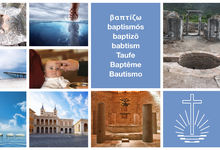The sacraments (55): God’s boundless love
There are three pillars that support the New Apostolic Church’s understanding of salvation for the departed. The first one is the answer to the question: “What does God desire?” — The Bible has a great deal to say on that subject, namely that all human beings are to be saved.

God’s universal will to save: this is the term used by theologians when they talk about God’s intent—which is born of His love—to make His salvation accessible to all human beings. The first epistle to Timothy most clearly expresses this intention of God, “who desires all men to be saved”. However, this is certainly not the only Bible passage that attests to this comprehensive divine purpose.
For all nations of the earth
It already begins in the Old Testament. For example, the covenant with Noah, which was sealed with the rainbow, applies to “all flesh that is on earth”. And the divine covenant with Abraham promises that, through Abraham’s descendants, “all the nations of the earth shall be blessed”.
The prophets likewise portray a future in which salvation is most definitely not reserved exclusively for the people of Israel. For example, we read in the book of Isaiah that God “will make for all people a feast of choice pieces”. And Jeremiah goes on to add that “the Gentiles shall come to [God] from the ends of the earth”.
And the Psalms too depict God as the end-time King and Judge of all human beings. For instance, psalm 96 begins with the words: “Sing to the Lord, all the earth.” Similarly, Psalm 98 concludes with the words: “For He is coming to judge the earth. With righteousness He shall judge the world, and the peoples with equity.”
A single house or the whole world?
At first, the divine will to save seems restricted in the incarnation of God: “I was not sent except to the lost sheep of the house of Israel,” says Jesus. But His parables and miracles already point far beyond this.
For instance, there was the time when Jesus healed the servant of the captain of Capernaum: “Many will come from east and west, and sit down with Abraham, Isaac, and Jacob in the kingdom of heaven,” He prophesied.
And when the disciples wanted to know the meaning of the parable of the tares in the field, Jesus explained: “The field is the world”—not just some little strip of land on the eastern extremity of the Mediterranean Sea.
The Saviour of all human beings
After Easter, the beneficiaries of this newly wrought salvation finally becomes clear. Jesus Himself brings this to expression in the great commission He gives to His Apostles, namely to make disciples of “all the nations”, to proclaim the gospel to “all creatures”, and to be witnesses of Christ “to the end of the earth”.
And the epistles of the New Testament also proclaim that the living God is the “Saviour of all men”. In between there is only one Mediator, namely “the Man Christ Jesus, who gave Himself a ransom for all”. After all, “He died for all”—that is, for the forgiveness of sins, “and not for ours only, but also for the whole world.”
Beyond all borders
God’s universal will to save transcends all boundaries—not only those of geography, but also of culture, status, and gender. As Apostle Paul declares: “There is neither Jew nor Greek, there is neither slave nor free, there is neither male nor female; for you are all one in Christ Jesus.”
Can death then set a limit for this divine intent? Hardly! After all, we read as follows in the letter to the Romans: “For to this end Christ died and rose and lived again, that He might be Lord of both the dead and the living.”
For the New Apostolic Church it is therefore clear that
- God’s will to save applies to all human beings of all time periods (CNAC 4.4).
- through Jesus Christ, salvation has been made accessible to all human beings, both living and dead (CNAC 4.4.2).
- His gospel applies equally to both (CNAC 9.6.3)
- the Apostles fulfil Jesus’ commission to preach the gospel, forgive sins, and dispense the sacraments to both the living and the dead (CNAC 9.6.3)
Sacraments for the departed? The idea certainly doesn’t contradict God’s universal will to save—quite the contrary! And what about Jesus’ actions? The facts of the answer may be somewhat in dispute, but they do point to a common conviction. That will be the focus of the next part in this series.
Photo: janews094 - stock.adobe.com
Article info
Author:
Date:
Keywords:
Andreas Rother
10.05.2022
sacraments,
divine services for ministers,
Doctrinal statements,
Bible











